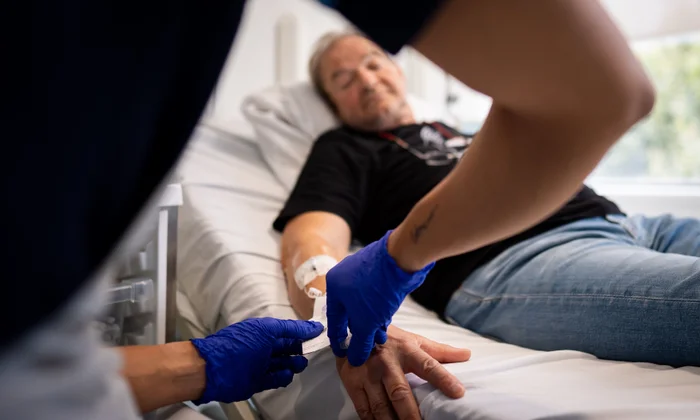24/08/2024
24/08/2024

LONDON, Aug 24: A lung cancer patient in the UK has become the first person to receive a new experimental vaccine designed to combat the disease, according to a report by the BBC.
The vaccine, named BNT116 and developed by BioNTech, utilizes mRNA technology similar to that used in the company’s successful COVID-19 vaccine. The treatment involves administering six syringes, each containing genetic material targeting different parts of the tumor, to stimulate five billion cells in the immune system to fight cancer.
Doctors believe that BNT116, which targets non-small cell lung cancer (NSCLC), offers a more precise alternative to chemotherapy, potentially reducing the collateral damage to healthy cells and minimizing side effects.
Approximately 130 patients with NSCLC will participate in the study, which involves six hospitals across the UK. The trial represents the world’s first use of an mRNA vaccine for lung cancer and is seen as a groundbreaking development in cancer treatment.
Lung cancer is the leading cause of cancer-related deaths globally, with about 1.8 million fatalities annually. Advanced stages of the disease, where tumors have metastasized, particularly have poor survival rates.
The phase 1 clinical trial of BNT116 is being conducted across 34 research sites in seven countries, including the UK, US, Germany, Hungary, Poland, Spain, and Turkey. In the UK, six sites in England and Wales are involved, with the first patient receiving the vaccine on Tuesday. The study will include about 20 patients from the UK.
The vaccine uses messenger RNA (mRNA) to present tumor markers from NSCLC to the immune system, aiming to enhance the body's ability to target and eliminate cancer cells while preserving healthy tissue.
Prof. Siow Ming Lee, a consultant medical oncologist at University College London Hospitals NHS Foundation Trust (UCLH), which leads the trial in the UK, described the new treatment as a significant advancement in mRNA-based immunotherapy. "We are entering an exciting new era of mRNA-based cancer treatment," he said. "This technology could be the next major phase in cancer therapy."
Janusz Racz, 67, a London resident and the first UK patient to receive the vaccine, expressed his motivation for participating in the trial due to his background in science. Diagnosed with lung cancer in May, Racz began chemotherapy and radiotherapy before joining the trial. He received six consecutive injections, each spaced five minutes apart, at the National Institute for Health Research UCLH Clinical Research Facility. He will continue with weekly doses for six weeks and then every three weeks for 54 weeks.
Racz hopes that his participation will contribute to advancing the treatment and improve survival rates for lung cancer patients. He also aspires to return to running and complete the London Marathon once his treatment is finished.
Prof. Lee highlighted the potential of the mRNA vaccine to enhance survival rates further. "We hope this vaccine, combined with immunotherapy, will offer an additional boost in treatment effectiveness and eventually become a standard care option worldwide."
The Guardian reported in May that thousands of patients in England would be fast-tracked into pioneering cancer vaccine trials through an innovative NHS "matchmaking" scheme aimed at saving lives. Science Minister Lord Vallance praised the launch of the lung cancer vaccine trial, noting its potential to transform treatment outcomes for patients.


